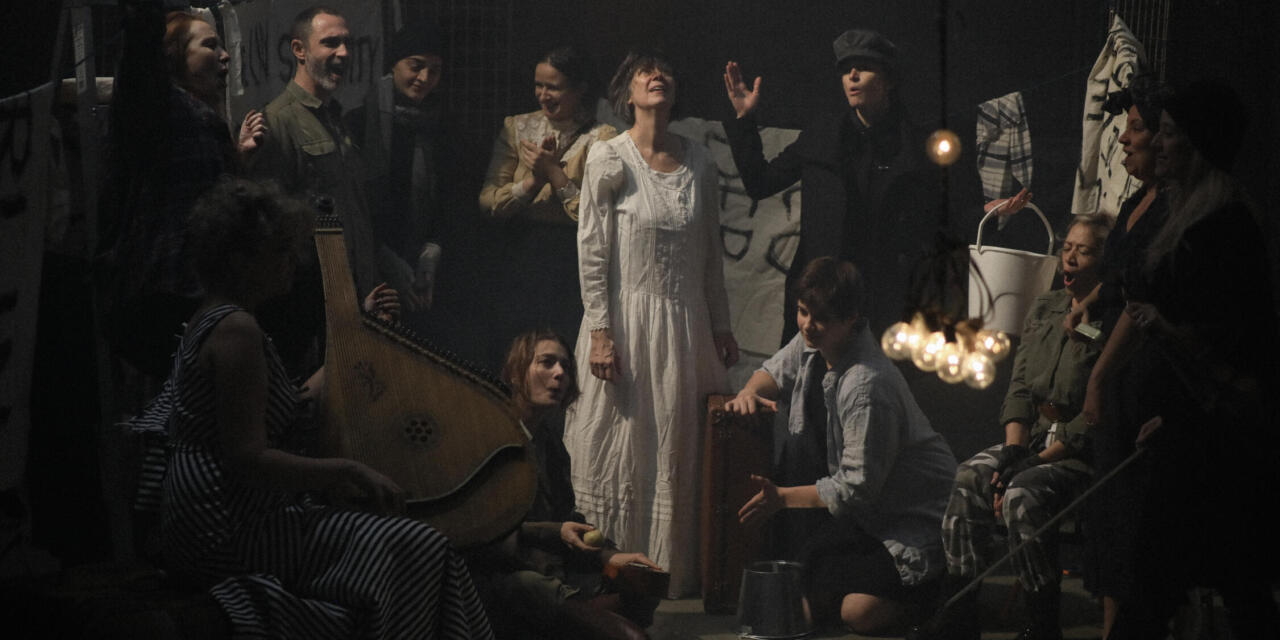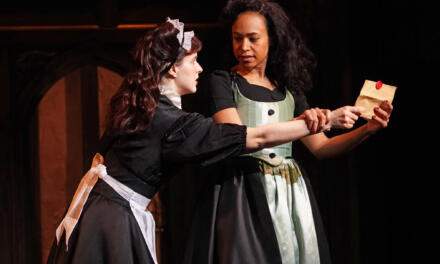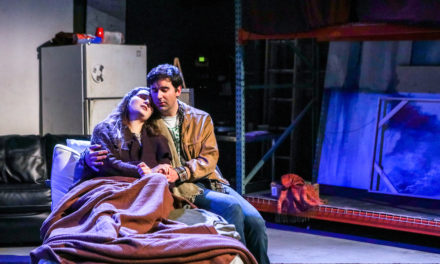Only a week after the invasion of Ukraine, three creatives found themselves nestled around a bartop. Kathryn Mederos Syssoyeva, Diana Zhdanova, and Jeremy Goren, the artistic directors of feminist collective AnomalousCo, were speaking of a show they had just seen. Suddenly, Zhdanova says, there was an epiphany. “I realized it all matters nothing to me now. All these authors, all these plays, they just didn’t mean anything after [the invasion] began. Theatre doesn’t mean anything when people die. How can you continue writing poetry when people die? I had this kind of angry response in me…and I said to Kathryn and Jeremy: ‘I think I need to respond theatrically, artistically, to what’s going on. I can’t sit silently and do nothing.’”
It was a sentiment that resonated deeply with Syssoyeva and Goren. “We believe that theatre must do something for the world,” says the latter. “So when Diana brought this up…it wasn’t even a question of ‘Should we do this?’ It was just, ‘How will we do this?’” Thus, over a round of beers, the idea for (beyond) Doomsday Scrolling was born.
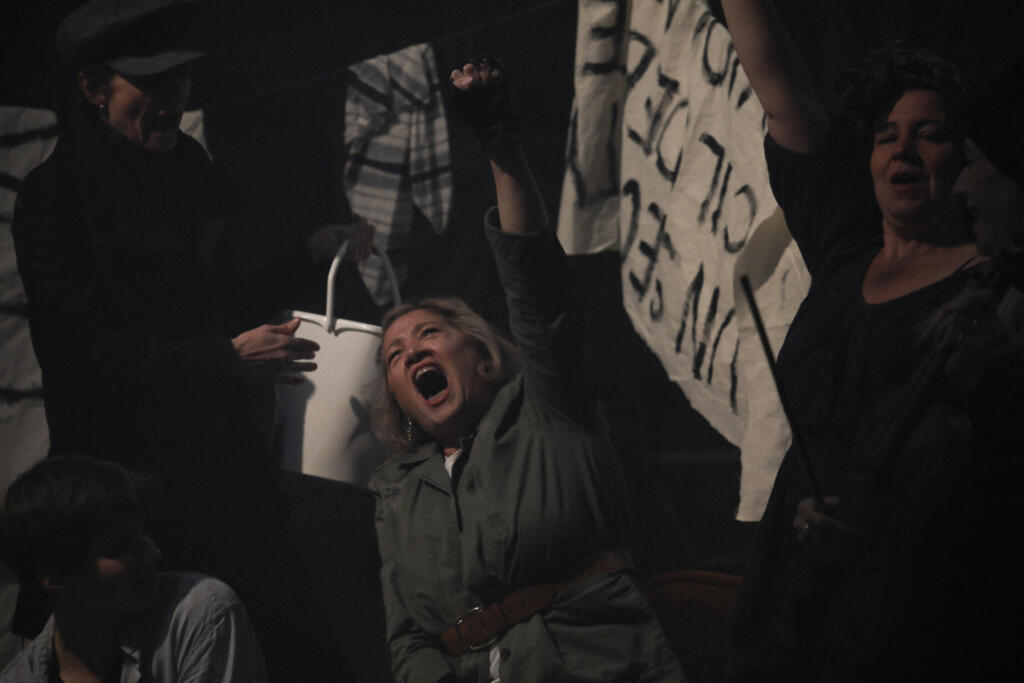
AnomalousCo’s “(beyond) Doomsday Scrolling.” PC: Jarrett Robertson
Set in a theatre acting as shelter, (beyond)… is a show both within and without time, exploring war across national and generational lines. Women are at the forefront, voices amplified, roles as social workers within wartime found in interweaving stories. Its current cast is comprised of twelve women and one man; they are dissidents, refugees, asylees, the inheritors of familial story and trauma. They are multilingual, as well, speaking twelve languages throughout the show: Russian, English, Ukrainian, Spanish, Italian, Neapolitan, German, Gaelic, Moldovan, Georgian, Icelandic, and Yiddish all find their way into the throughline.
It is this intermingling that gives the show its power. “It’s a remarkable intermix of the personal and the historical,” says Syssoyeva. The dramaturgy of this piece is truly something to marvel at, a remarkable work of collaboration. In the beginning, there were songs, poetry, journalistic articles. Syssoyeva searched for plays that fit the bill, and, with her stepfather’s help, landed on Brecht’s The Jewish Wife: the short play, originally centered around a Jewish woman fleeing Nazi Germany, has now been distributed amongst multinational characters with similar strife. The collaborative efforts of two dramaturgs of differing backgrounds—Israeli Orian Assayag and Chinese Lu Li—have brought found footage and written entries to the fold.
It is the personal findings of the cast, however, that strike closest to heart. Many of these women have direct connections to the stories they tell. Claudia Godi, of Italian heritage, embodies her family’s history: her grandfather was a partigiani in the Italian resistance movement, and imprisoned in a concentration camp; to maintain sanity through starvation, he wrote hundreds of imagined recipes, a source she utilized in building her character. Another tells the tale of her cousin in Hurricane Katrina. Another finds her way into the minds of her Scottish ancestors.
And then there is Lesya Verba, a name that has found coverage in the past year. A brilliant Ukrainian musician and refugee from the war, Verba found herself drawn to this work early in its development. At first, Syssoyeva, Zhdanova, and Goren paid no attention to her emails, coming within the onslaught of interest they were receiving at the time. Finally, as the three recall, Verba walked into rehearsal one day, unannounced, hoisting her bandura. She sat down, quietly introduced herself, and asked, “What do you want to hear?” In turn, she let loose a raw, stunning wail of a Ukrainian folk song; each member of the team was left in tears. To this day, in this current iteration, her songs remain a pulsating heart of the show.
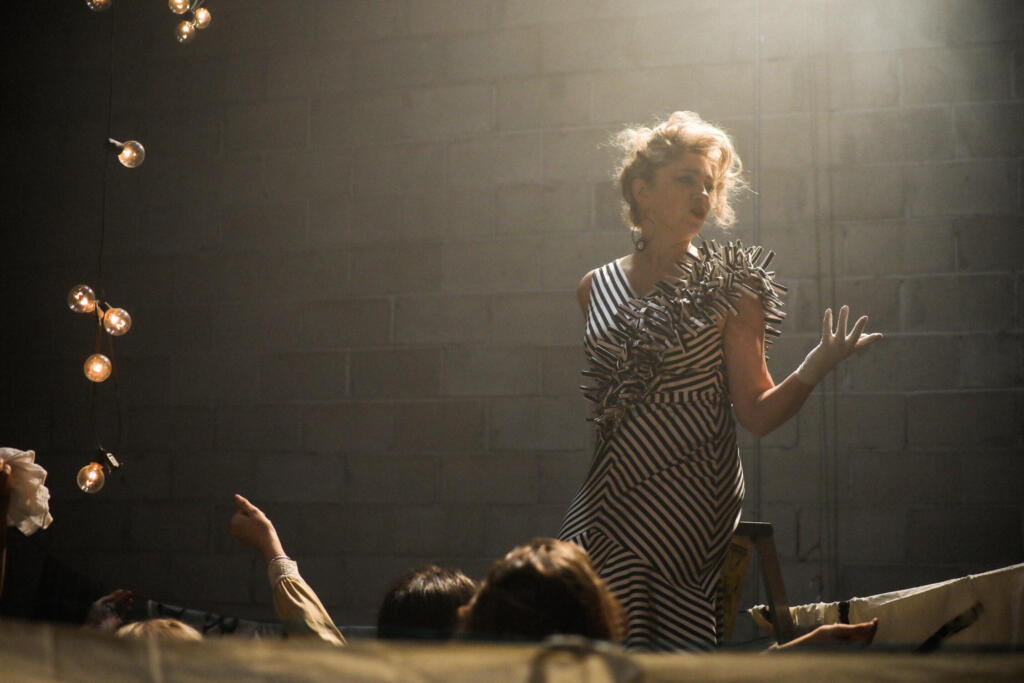
AnomalousCo’s “(beyond) Doomsday Scrolling.” PC: Jarrett Robertson
There are three throughlines within (beyond) Doomsday Scrolling: the political cabaret, through which music finds its hold, growing from folk to punk rock; the daily life of the shelter, featuring the interactions of the women; and the memories of each, existing outside real time and entwining with their theatrical refuge. “The first layer for a lot of audience members is emotional,” Syssoyeva explains. “It kind of shuts down the [political] debate for a while, so people just feel that this should not be normative, that we should not [just] be having cold, calm conversations, that there are lives and bodies and cultures on the line. People are dying, and cultures are being erased. That’s something you cannot get off the newspaper.”
“This is a moral imperative,” Goren agrees. “I don’t ever feel like making art when there’s not some moral imperative. It’s a kind of self-delusion that we can afford ourselves to say, ‘This work isn’t political.’ In the real world, everything is political.” That is the message that (beyond)… hopes to communicate, utilizing humanization to keep the world’s happenings in the forefront of the public’s mind. The goal is to combat compassion fatigue and confront Eurocentric media and cultural coverage. Speaking of migration, asylum, genocide and ethnocide through the lens of true story and cabaret allows people to feel, to remember, and to want to support.
“I’ve lived in politics for this past year,” Zhdanova says, herself a Russian dissident. “[It’s] like my life right now, in a way. And at the same time, because we are portraying all these women running from different wars, making them real…here is the woman who is in the war, whose life is damaged by the war, while all of these politicians are having these high-level discussions. The contrast between that is an enormous thing. Maybe someone will see, it’s not just me, it’s not me failing, the war is failing my life.”
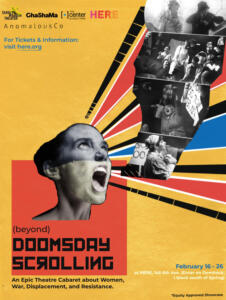
PC: AnomalousCo
This impact is one that AnomalousCo hopes to continue improving, and to eventually tour across America and Europe. They’re in the process of searching for more collaborators from outside their Westernized circles, holding a “burning desire” to expand their stories into Africa, the Middle East, the Asian continent, and further. That expansion punctuates the confrontation Syssoyeva wants: “We are going into an ever-building crisis of migration of peoples, and what the hell are we gonna do with that? How are we going to respond? Who are we going to be? And how do you get people to accept others for more than three months at a time?”
Clearly, (beyond) Doomsday Scrolling has already begun its resonance. Last year, its earliest performances raised $13,000 in humanitarian aid. They’ve collaborated with the Pro-English Theatre of Kyiv, the first theatre to reactivate after the invasion, the first to begin acting as a shelter for those fleeing. The show’s creatives have continued their efforts in monetary assistance and ignorance annihilation, building from small-scale ripples to global impact.
After all, as Syssoyeva says, “[Awakening privilege] is never out of season.”
AnomalousCo is a predominantly queer-woman led, feminist, transdisciplinary performance collective based in New York City. (beyond) Doomsday Scrolling can be seen from February 16 – 26 at HERE Arts. Tickets and information can be found here.
This post was written by the author in their personal capacity.The opinions expressed in this article are the author’s own and do not reflect the view of The Theatre Times, their staff or collaborators.
This post was written by Rhiannon Ling.
The views expressed here belong to the author and do not necessarily reflect our views and opinions.

